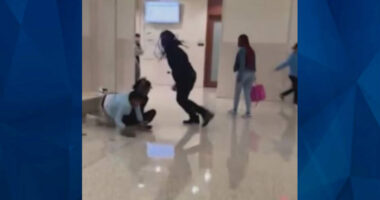Share this @internewscast.com
Left: Donald Trump delivers a speech at the annual Road to Majority conference in Washington, DC, in June 2024 (Allison Bailey/NurPhoto via AP). Right: U.S. District Judge Paul L. Friedman speaks at an ABA Criminal Justice Section event on March 9, 2017 (ABA Criminal Justice Section/YouTube).
On Wednesday, a federal judge in Washington, D.C., sharply criticized the Trump administration while ordering the “immediate” reinstatement of a grant that the Department of Education had eliminated earlier this year. This grant is vital to supporting desegregation efforts in the Southern United States.
“Given the historical context of race in America and the Southern Education Fund’s commitment since the Civil War, the decision to terminate its grants over ‘DEI’ concerns is truly astonishing,” stated U.S. District Judge Paul L. Friedman in a detailed 37-page opinion.
The Bill Clinton appointee ruled in favor of granting a preliminary injunction for the Southern Education Foundation (SEF), which sued the Trump administration after it abruptly terminated the group’s Equity Assistance Center program grant on Feb. 13 through executive orders. Friedman directed the government to reinstate the grant and reimburse SEF “for all outstanding expenses” after determining that the DOE’s termination “likely violated federal law,” according to a Thursday press release from SEF.
“The Court finds that SEF has sufficiently demonstrated that it will suffer irreparable harm because the defendants’ actions threaten the livelihoods of SEF’s employees, its professional reputation, and the very existence of its programs,” Friedman said.
Love true crime? Sign up for our newsletter, The Law&Crime Docket, to get the latest real-life crime stories delivered right to your inbox.
The EAC grant, according to SEF officials, enables the foundation to operate its Equity Assistance Center-South (EAC-South) program, which provides technical assistance to public school districts and state agencies across 11 Southern states, supporting their compliance with federal civil rights laws. The program is part of a network of Equity Assistance Centers, formerly known as Desegregation Assistance Centers, that was originally established to aid school systems in dismantling racial segregation.
“Today, 70 years later, there are still 132 open federal school desegregation cases,” Friedman said. “An overwhelming 130 of those cases are concentrated in states located in the South.”
Friedman cited the landmark case of Brown v. Board of Education in his ruling, in which the Supreme Court held that racial segregation in public education was unconstitutional and ordered its elimination “with all deliberate speed.” He said the decision to dump the EAC-South grant “contravenes the very principle of ‘deliberate speed”” mandated by the high court. Friedman quoted the court’s ruling in the case directly, noting how “Brown never contemplated that the concept of ‘deliberate speed’ would countenance indefinite delay in elimination of racial barriers in schools.”
“Nor did President Eisenhower and the courageous judges in the South who interpreted Brown,” Friedman said. “They could hardly have imagined that some future Presidential Administration would hinder efforts by organizations like SEF — based on some misguided understanding of ‘diversity, equity, and inclusion’ — to fulfill Brown’s constitutional promise to students across the country to eradicate the practice of racial segregation.”
SEF officials praised Friedman’s ruling, saying in a press release Thursday that “with this order, the court takes a stand for the rule of law … and for the prohibition against racial segregation as congressionally enacted by the 1964 Civil Rights Act.”
“This decision represents an important step toward protecting what never should be under threat — federal support for equal education opportunity regardless of race,” said SEF President and CEO Raymond Pierce. “This work is not controversial. It’s constitutional. When the more than 130 active school desegregation court orders across the South have been fully resolved, and all students enjoy the full educational opportunities guaranteed under federal law, SEF will be the first to suggest closing out this grant. Until then, we seek to continue to uphold the Supreme Court’s decision in Brown by providing technical assistance to schools through the EAC-South.”
















